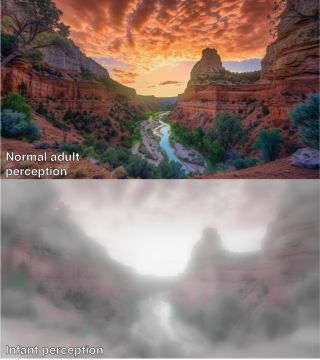Consciousness
Do Babies Have Consciousness?
What it might be like to see the world as a baby.
Updated January 2, 2024 Reviewed by Lybi Ma
Key points
- Infants cannot speak, and so researchers have debated when consciousness emerges in early development.
- Advances in understanding the consciousness of adults help us understand infant consciousness.
- Even after consciousness emerges, infants perceive the world very differently from adults.
When does consciousness begin? There is evidence that some form of conscious experience is present by birth, and perhaps even in late pregnancy, an international team of researchers led by my colleague Tim Bayne and I have concluded in a new review manuscript. The findings, recently published in the peer-reviewed journal Trends in Cognitive Science, have important clinical, ethical, and potentially legal implications.
In the study, entitled "Consciousness in the Cradle: on the Emergence of Infant Experience," we argue that, by birth, the infant’s developing brain is likely capable of conscious experiences. Although each of us was once a baby, infant consciousness remains mysterious, because infants cannot tell us what they think or feel, according to my colleague Dr. Tim Bayne, professor of philosophy at Monash University. “Nearly everyone who has held a newborn infant has wondered what, if anything, it is like to be a baby. But of course, we cannot remember our infancy, and consciousness researchers have disagreed on whether consciousness arises early (at birth or shortly after) or late—by one year of age, or even much later.”

To provide a new perspective on when consciousness first emerges, we reviewed recent advances in consciousness science. In adults, some markers from brain imaging have been found to reliably differentiate consciousness from its absence, and are increasingly applied in science and medicine. This is the first time that these advances, as translated to infants, have been reviewed in detail.
My co-author Dr. Lorina Naci, Associate Professor at Trinity College Dublin in Ireland, who leads the Consciousness and Cognition Group, explained: “Our findings suggest that newborns can integrate sensory and developing cognitive responses into coherent conscious experiences to understand the actions of others and plan their own responses.”
It is even possible that birth itself triggers the onset of consciousness. Perhaps the first thing the newborn infant realizes is that the outside world is very unpredictable relative to the womb's environment. Things are constantly changing, and so the newborn must build a mental model of the world to adapt and predict things.
However, we don’t rule out the possibility that consciousness might already start some weeks before birth. My coauthor Dr. Julia Moser, currently at the University of Minnesota, has led work showing that third-trimester fetuses appear to be capable of learning sequences of auditory beeps. When an auditory tone deviates from a pattern established earlier in the experiment, the fetus shows this surprise response in its magnetic brain activity. The neural activity shows a field deflection as if the fetus is saying, "Huh?"
Our new paper also sheds light on what it is like to be a baby. We know that seeing is much more immature in babies than hearing, for example. Furthermore, this work suggests that, at any point in time, infants are aware of fewer items than adults and can take longer to grasp what’s in front of them, but they can easily process more diverse information, such as sounds from other languages, than their older selves. Infants can perceive many things that adults cannot, like the differences between vowel sounds in a foreign language. By 10 months or so, we lose this ability as the brain decides these perceptual differences are no longer relevant and discards them.
It's still unclear when, exactly, human consciousness begins, but we hope our paper will guide new research by reviewing what we already know and what questions remain. I'm fascinated by the question of whether infants or even fetuses can already dream. A promising new theory of dreaming is Erik Hoel’s overfitted brain hypothesis, which says that dreams are essentially scrambled versions of inputs from waking life that help with generalization learning so that you learn to recognize things in new contexts and new situations.
A newborn has barely begun to learn anything yet, but perhaps they already dream about the sounds and smells of their mothers. If fetuses dream, perhaps they dream of the taste of the amniotic fluid. As I recently told Der Spiegel, dreams are weird, and fetal dreams (if they occur) are probably weirder than anything we can imagine.
This post is adapted from an Institute for Advanced Consciousness Studies press release.
Facebook/LinkedIn image: Monkey Business Images/Shutterstock
References
Bayne, T., Frohlich, J., Cusack, R., Moser, J., & Naci, L. (2023). Consciousness in the cradle: on the emergence of infant experience. Trends in Cognitive Sciences.
Moser, J., Schleger, F., Weiss, M., Sippel, K., Semeia, L., & Preissl, H. (2021). Magnetoencephalographic signatures of conscious processing before birth. Developmental cognitive neuroscience, 49, 100964.
Hoel, E. (2021). The overfitted brain: Dreams evolved to assist generalization. Patterns, 2(5).




